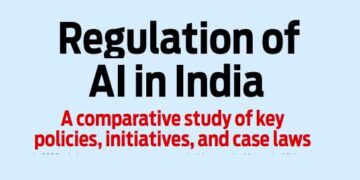 As Artificial Intelligence (AI) continues to gain momentum globally, concerns about its ethical use, privacy, and security have risen to the forefront of policy discussions. The Indian regulatory landscape for AI has evolved significantly in recent years, reflecting the country’s efforts to promote AI’s responsible development and use. This article offers a comprehensive overview of India’s current AI regulatory framework, highlighting key policies, initiatives, regulatory bodies, and relevant case laws. Furthermore, it includes a comparative study of two foreign jurisdictions: the European Union (EU) and the United States (US)
As Artificial Intelligence (AI) continues to gain momentum globally, concerns about its ethical use, privacy, and security have risen to the forefront of policy discussions. The Indian regulatory landscape for AI has evolved significantly in recent years, reflecting the country’s efforts to promote AI’s responsible development and use. This article offers a comprehensive overview of India’s current AI regulatory framework, highlighting key policies, initiatives, regulatory bodies, and relevant case laws. Furthermore, it includes a comparative study of two foreign jurisdictions: the European Union (EU) and the United States (US)
INDIAN LANDSCAPE Key policies and initiatives
National strategy for Al (2018): India’s primary policy document on AI, the National Strategy for Artificial Intelligence, was released by NITI Aayog in 2018. It outlines India’s vision for AI, emphasising the importance of leveraging AI for inclusive growth and focusing on five key sectors: healthcare, agriculture, education, smart cities, and smart mobility.
National AI portal (2020): Launched in 2020, the national AI portal serves as a one-stop platform for AI-related developments in India, facilitating the sharing of resources and collaboration among stakeholders, including startups, researchers, and policymakers.
Responsible AI for Youth Programme (2020): To build a future workforce skilled in AI, the Ministry of Electronics and Information Technology (MeitY) introduced the Responsible AI for Youth Programme in 2020, aiming to empower young students with AI skills.
AI standards and guidelines: The Bureau of Indian Standards (BIS) has taken the initiative to develop national standards for AI, focusing on areas such as data privacy, data quality, and AI governance.
Regulatory bodies
Ministry of Electronics and Information Technology: MeitY is the primary governing body responsible for the implementation and management of AI policies in India. It oversees the development of AI-related guidelines and standards, as well as the National AI Portal.
NITI Aayog: As the Government’s premier think-tank, NITI Aayog plays a pivotal role in formulating national strategies for AI and fostering collaboration among various stakeholders in the AI ecosystem. Bureau of Indian Standards: BIS is responsible for developing and implementing AI standards and guidelines, ensuring that AI applications adhere to ethical principles and respect privacy and security requirements.
Relevant case laws
1. KS Puttaswamy vs Union of India (2017) 10 SCC 1
Although not directly related to AI, the landmark judgment by the Supreme Court of India in the KS Puttaswamy case recognised the fundamental right to privacy under Article 21 of the Indian Constitution. This case has significant implications for AI, as data privacy concerns are at the core of AI technologies. The judgment serves as a foundation for data protection regulations and will likely influence the development of AI policies and guidelines concerning privacy in India.
2. Visvesvaraya Technological University vs IBM India Pvt. Ltd. W.P. No. 16058/2017 (Karnataka High Court)
In this case, the Karnataka High Court dealt with a dispute involving AI technology related to the extraction and analysis of data. The court emphasised the importance of ensuring the protection of intellectual property rights in AI technologies and acknowledged the challenges in attributing authorship to AI-generated works. This case highlights the need for a clear legal framework for AI-related intellectual property issues in India.
COMPARATIVE STUDY European Union
1. A risk-based approach, classifying AI systems into high, medium, and low-risk categories, with corresponding regulatory requirements.
2. Obligations for transparency, accountability, and data governance for AI developers and users.
3. The establishment of a European Artificial Intelligence Board, responsible for ensuring consistent application of the legal framework across EU member states. United States
1. The National AI Initiative Act (2020), which establishes a coordinated national strategy for AI research and development, focusing on areas such as workforce development, international collaboration, and standards development.
2. The establishment of the National AI Initiative Office, which serves as the central hub for coordinating AI efforts across federal agencies.
3. The National Institute of Standards and Technology (NIST) leads the development of AI standards and guidelines, addressing issues such as privacy, security, and interoperability.
Relevant Case Laws
1. EU: Google Spain SL vs Agencia Española de Protección de Datos (2014) Case C-131/12 (Court of Justice of the European Union) This landmark case by the Court of Justice of the European Union (CJEU) established the “right to be forgotten,” which is closely related to AI and data protection. The ruling emphasized the balance between individual data privacy rights and the public’s right to access information, setting a precedent for the ethical use of AI technologies in the EU.
2. US: Carpenter vs United States (2018) 138 S. Ct. 2206 In this case, the US Supreme Court held that the Government’s acquisition of cell-site location information (CSLI) constituted a search under the Fourth Amendment, requiring a warrant. While not directly related to AI, this case demonstrates the importance of privacy considerations in the context of emerging technologies, including AI applications that involve the collection and processing of personal data.
CONCLUSION
India’s regulatory landscape for AI has evolved significantly in recent years, with a focus on inclusive growth, skill development, and the establishment of standards and guidelines. Relevant case laws in India and foreign jurisdictions underscore the importance of addressing privacy and intellectual property concerns in AI development and regulation. As India continues to develop its AI ecosystem, it is crucial to strike a balance between fostering innovation and ensuring the responsible development and use of AI.
In light of the rapid advancements in AI technology, it is essential for India to continually refine its regulatory framework, taking inspiration from global best practices and lessons learned from relevant case laws. Collaboration between Government, industry, academia, and civil society is key to creating a vibrant and responsible AI ecosystem that benefits all stakeholders and addresses potential risks and challenges.
















